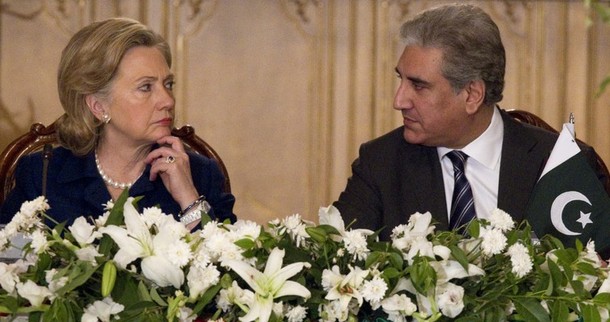
Ever since his ‘head-to-toe, soup-to-nuts’ review of US policy towards Afghanistan and Pakistan, President Barack Obama’s ‘Af-Pak’ strategy has provoked criticism on both conceptual and operational grounds.
General Stanley McCystral’s dismissal was the most dramatic manifestation of the difficulties in calibrating the political and military aspects of the new policy. More contentious than internal turf wars has been the fuzziness surrounding Pakistan’s place in the overall scheme. Most analysts grudgingly concede that the strategy’s success depends on the Pakistani army, which paradoxically is seen both as an obstacle and the key to peace in Afghanistan.
If he is to vindicate himself before the bar of public opinion in 2012, President Obama has to overcome the contradiction of relying on an ally whose regional interests are at odds with those of the US. Pakistan’s military wants to keep India out of Afghanistan to avoid facing hostilities on its eastern and western fronts. By expediently leaving India out of the loop and coining the neologism ‘Af-Pak’, Washington has compounded the conceptual flaws in the ‘war on terror’ that the phrase ‘war on Al-Qaeda’ is trying to correct.
Pakistan has paid an enormous price in terms of internal security for three decades of meddling in Afghanistan. Its army’s Afghan policy stems from an India specific strategic paradigm that spotlights Kashmir. Given the stormy history of relations between the two neighbors, the American strategy of keeping mum on Kashmir to appease New Delhi is self-defeating.
Pakistan may be where the next attack on America is being plotted, but Washington’s different arms and limbs are struggling to fit all the pieces of a bewildering jigsaw without unhinging the fixed ones. A nuclear state threatened by an al-Qaeda backed insurgency in the federally administered tribal areas (FATA), Pakistan’s stability is a matter of concern, however odious its external posturing. The ISI’s suspected complicity in the November 2008 Mumbai attacks highlighted the intrinsic link between Afghanistan, Pakistan and India. In keeping with Af-Pak’s fragmentalist approach, American officials, to India’s chagrin, have stopped blaming Pakistan for ‘not doing enough’ and are praising its army for cracking down on militancy in the northwest. Yet all is not well with the relationship.
The surge in drone attacks on Pakistani soil has taken out key militants, but in fanning anti-Americanism complicated the army’s fight against insurgency. Obama’s timetable for an American withdrawal by 2011 has encouraged the army high command to continue backing Mullah Omar’s Afghan Taliban and the Haqqani network to ensure a say in a post-USA Afghanistan.
With its public image largely restored after hitting a low in the closing months of Pervez Musharraf’s tenure, the army is back in the business of calling the shots. This partly explains why efforts to curb the ISI by reversing the civil-military equation through the Kerry-Lugar bill have not won widespread support nor changed popular opinions of the US as an enemy of the Pakistani people and a benefactor of an oppressively venal ruling elite. There is also no guarantee that civilian supremacy in Pakistan can usher in an era free of ISI manipulated religious militants. The complicity of the mainstream parties with extremists for electoral advantage is too entrenched to immediately result in a democracy America or, for that matter, India can feel safe about.
Peace will elude Afghanistan so long as Pakistan and India continue seeing their respective interests there as a zero sum game. Anarchy in Afghanistan and FATA pose a grave threat not just to Pakistan but the entire subcontinent. Washington’s policy of de-hyphenating relations with India and Pakistan is seriously limited since what is an opportunity for one may be the cause of the problem for the other. Placing Kashmir on the backburner while Indian security forces are killing stone pelting teenagers, not terrorists from across the border, and expecting Pakistan’s unwavering cooperation in return for economic and military aid is an old pipe dream. To succeed where others have failed, President Obama needs a bold new approach, one that can balance power with principle and help lift the burden of historical animosities that have drained Indian and Pakistani energies on Kashmir and cast such a deadly shadow over Afghanistan.
Ayesha Jalal is Mary Richardson Professor of History, Tufts University, and Non Resident Senior Fellow of the Atlantic Council’s South Asia Center. Photo credit: Getty Images.
Image: Pakistan%20FM%20and%20HClinton.jpg

